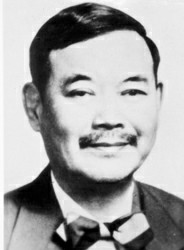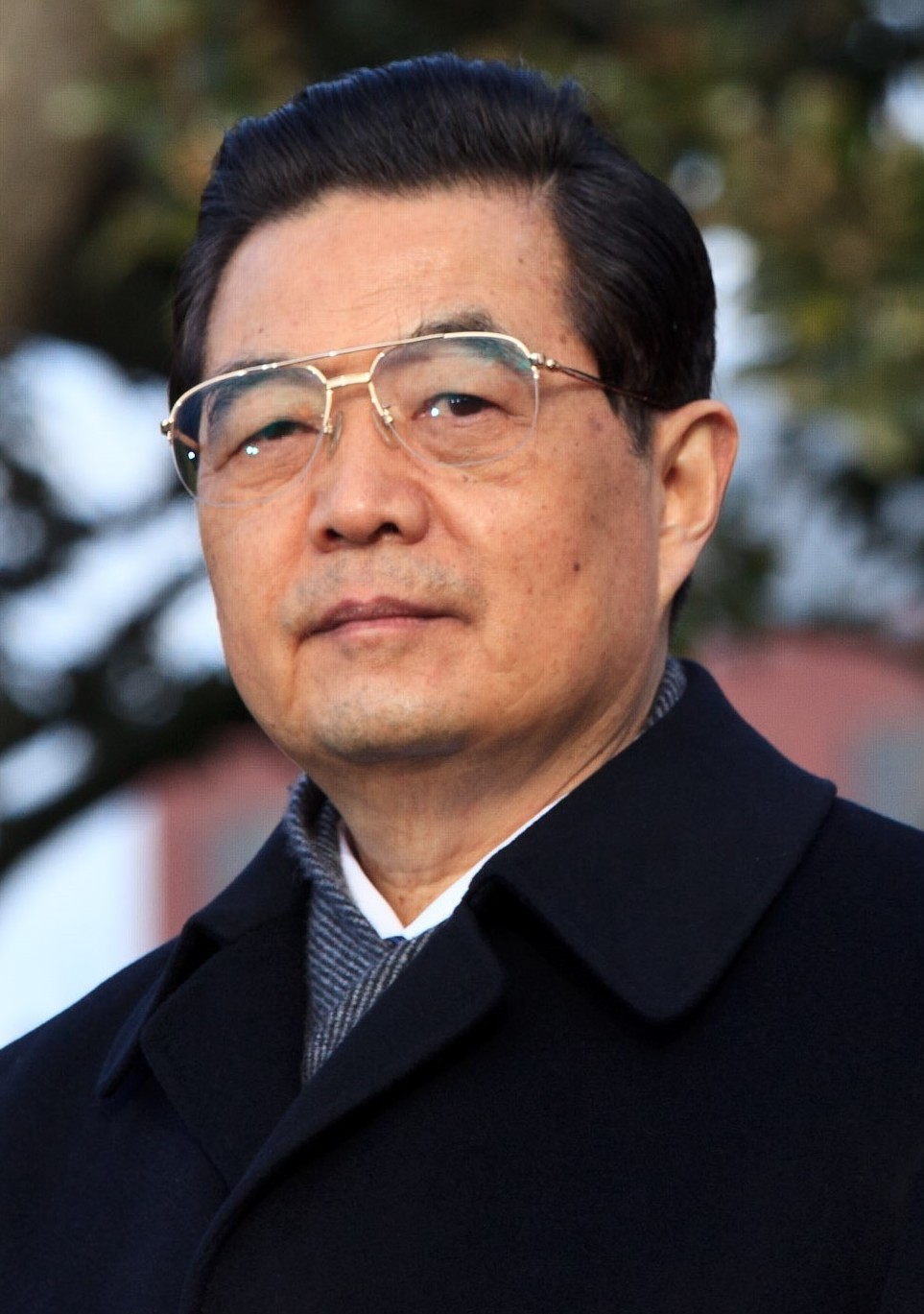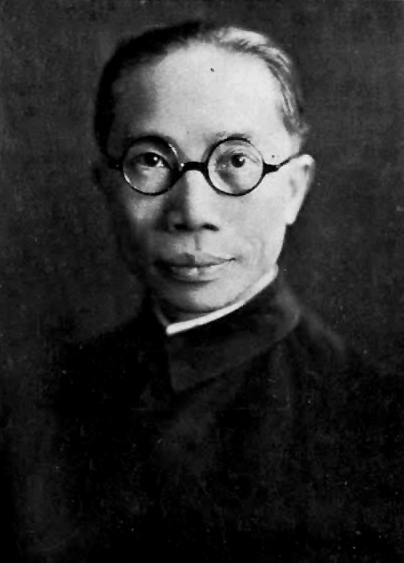|
Hu Dunfu
Hu Dunfu (; 1886 – December 1, 1978) was a Chinese mathematician and pioneer in higher education. He won a Qing government scholarship to study at Cornell University, and became the first dean of Tsinghua University at the age of 25. He was then briefly dean of Fudan University, before establishing Utopia University in 1912 and developing it into one of China's best private universities. He also served as head of the mathematics department of National Chiao Tung University and the first president of the Chinese Mathematical Society, which he co-founded in 1935. Early life and education Hu Dunfu was born in 1886 into a prominent family of scholar-officials in Wuxi, Jiangsu Province, a descendant of the Song dynasty scholar and educator Hu Yuan ( 胡瑗; 993–1059). When he was 11, he was accepted by the elementary school of Nanyang Public School (now Shanghai Jiao Tong University), and later attended its secondary school. When his teacher Ma Xiangbo left Nanyang to establish Au ... [...More Info...] [...Related Items...] OR: [Wikipedia] [Google] [Baidu] |
Hu (surname)
Hu ( 胡) is a Chinese surname. In 2006, it was the 15th most common surname in China. In 2013, it was the 13th most common in China, with 13.7 million Chinese sharing this surname. In 2019, Hu was the fifteenth most common surname in Mainland China. Some other, less common surnames pronounced Hu include 瓠, 護, 戶, 扈, 虎, 呼, 忽, 斛 and 壶. In Cantonese, “胡” is also pronounced as "Wu" or "Woo" or "Ow". Meaning In Classical Chinese, ''hú'' 胡 meant: " dewlap; wattle" and was a variant Chinese character for "how; why; what" (''he'' 何), "long-lasting; far-reaching" (''xia'' 遐), "part of a dagger-axe", ''hu-'' in "butterfly" (''hudie'' 蝴蝶), or possibly "Northern Barbarians". History According to tradition, the Hu (胡) surname has several historical origins. First, Hu could derive from the family of Duke Hu of Chen. King Wu of Zhou (r. 1046-043 BCE) enfeoffed his son-in-law Gui Man 媯滿 (supposedly a descendant of the legendary sage king E ... [...More Info...] [...Related Items...] OR: [Wikipedia] [Google] [Baidu] |
Huang Yanpei
Huang Yanpei (; 1 October 1878 – 21 December 1965) was a Chinese educator, writer, and politician. He was a founding pioneer of the China Democratic League. Life Huang was born in Neishidi, Chuansha, Jiangsu (now part of Pudong, Shanghai) during the reign of the Guangxu Emperor in the late Qing dynasty. His mother died when he was 13 and his father died when he was 17, so he lived with his maternal grandfather, who gave him a traditional Chinese education. In his young age, he studied at Dongye School (東野學堂) and read the Four Books and Five Classics. Before he reached adulthood, he worked as an informal teacher in his hometown to support his family. In 1899, he topped the imperial examination in Songjiang Prefecture and obtained the position of a ''xiucai'' (秀才). Huang's uncle sponsored him to read Western studies. In 1901, he was enrolled in Nanyang Public School (now Jiao Tong University), where he met Cai Yuanpei, who was teaching the Chinese language there. A ... [...More Info...] [...Related Items...] OR: [Wikipedia] [Google] [Baidu] |
Communist Party Of China
The Chinese Communist Party (CCP), officially the Communist Party of China (CPC), is the founding and sole ruling party of the People's Republic of China (PRC). Under the leadership of Mao Zedong, the CCP emerged victorious in the Chinese Civil War against the Kuomintang, and, in 1949, Mao proclaimed the establishment of the People's Republic of China. Since then, the CCP has governed China with eight smaller parties within its United Front and has sole control over the People's Liberation Army (PLA). Each successive leader of the CCP has added their own theories to the party's constitution, which outlines the ideological beliefs of the party, collectively referred to as socialism with Chinese characteristics. As of 2022, the CCP has more than 96 million members, making it the second largest political party by party membership in the world after India's Bharatiya Janata Party. The Chinese public generally refers to the CCP as simply "the Party". In 1921, Chen Duxiu and Li ... [...More Info...] [...Related Items...] OR: [Wikipedia] [Google] [Baidu] |
Su Buqing
Su Buqing, also spelled Su Buchin (; September 23, 1902 – March 17, 2003), was a Chinese mathematician, educator and poet. He was the founder of differential geometry in China, and served as president of Fudan University and honorary chairman of the Chinese Mathematical Society. Biography Su was born in Pingyang County, Zhejiang Province in 1902, with ancestry from Quanzhou. After attending Zhejiang Wenzhou High School, he graduated from Tohoku Imperial University in Japan in 1927 and received his Ph.D. from the university in 1931. After returning to China, he first served as a professor and dean at Zhejiang University (he established the Chen-Su School with Chen Jiangong), and later as professor and president of Fudan University. He was honorary chairman of the Chinese Mathematical Society and elected to Academia Sinica and the Chinese Academy of Sciences in 1948 and 1955 respectively. Su Buqing and Hua Luogeng were the most influential figures in mathematical society of m ... [...More Info...] [...Related Items...] OR: [Wikipedia] [Google] [Baidu] |
Chen Jiangong
Chen Jiangong (; 1893–1971), or Jian-gong Chen, was a Chinese mathematician. He was a pioneer of modern Chinese mathematics. He was the dean of the Department of Mathematics, National Chekiang University (now ), and a founding academician the (elected 1955). Life Chen was born in Shanyin County (now ), |
Xiong Qinglai
Xiong Qinglai, or Hiong King-Lai (, October 20, 1893 – February 3, 1969), courtesy name Dizhi (), was a Chinese mathematician from Yunnan. He was the first person to introduce modern mathematics into China, and served as an influential president of Yunnan University from 1937 through 1947. A Chinese stamp was issued in his honour. Biography Xiong was born in Xizhai village (nowadays named Qinglai village to honour him) of Mile County, Yunnan province. He studied in Europe for eight years (1913 to 1921) before returning to China to teach. During that time, Chinese university-level mathematics was only comparable to Western secondary-school mathematics level. In 1921, he established the Department of Mathematics of National Southeastern University (Later renamed National Central University and Nanjing University), beginning undertook the task of writing more than ten textbooks on geometry, calculus, differential equations, mechanics, etc. It was the first endeavor in history to i ... [...More Info...] [...Related Items...] OR: [Wikipedia] [Google] [Baidu] |
Feng Zuxun
Feng may refer to: *Feng (surname), one of several Chinese surnames in Mandarin: **Féng (surname) ( wikt:冯 féng 2nd tone "gallop"), very common Chinese surname **Fèng (surname) ( wikt:鳳 fèng 4th tone "phoenix"), relatively common Chinese family name **Fēng (surname) ( wikt:風 fēng 1st tone "wind"), rare Chinese surname **Fèng ( wikt:奉 fèng 4th tone "offer"), rare Chinese surname *Feng (chieftain), legendary Jutish chieftain and the prototype for William Shakespeare's King Claudius *FEng, Fellow of Royal Academy of Engineering *Fengjing, the former capital of the duchy of Zhou during the late Shang dynasty *Feng County, Shaanxi, in China *Feng County, Jiangsu, in China *Fenghuang, mythological birds of East Asia *Feng (mythology), Chinese legendary creature that resembles a lump of meat and regenerates after being eaten *Cardinal Feng, in Monty Python's Spanish Inquisition *Feng Office (web application), open source team collaboration software * Feng (program), opensou ... [...More Info...] [...Related Items...] OR: [Wikipedia] [Google] [Baidu] |
Li Zhaohuan
Li Zhaohuan (; 1898–1969), also known as Juwan Usang Ly, was a Chinese educator, politician and banker. He served as President of National Chiao Tung University (now Shanghai Jiao Tong University) and the last President of Hangchow University. Biography Li was born in Nanhai County, Guangdong Province in 1898. Li's courtesy name was Yaosheng (曜生, also spelled Usang). Li studied in the United States. He obtained BA in economics from Columbia University, and MA in politics from the University of Pennsylvania. Li became a member of Tongmenghui. Li was the general manager of the Hong Kong Industrial Bank (香港工商银行) and Chinese Merchants Bank (华商银行). Li was the director of the Guangzhou-Kowloon Railway Administration Bureau. Li was a professor of several notable universities, including Chiao Tung University (current mainly Shanghai Jiao Tong University in Shanghai, Xi'an Jiaotong University in Xi'an, and National Chiao Tung University in Hsinchu, Taiwan), ... [...More Info...] [...Related Items...] OR: [Wikipedia] [Google] [Baidu] |
Tianjin
Tianjin (; ; Mandarin: ), alternately romanized as Tientsin (), is a municipality and a coastal metropolis in Northern China on the shore of the Bohai Sea. It is one of the nine national central cities in Mainland China, with a total population of 13,866,009 inhabitants during the 2020 Chinese census. Its built-up (''or metro'') area, made up of 12 central districts (all but Baodi, Jizhou, Jinghai and Ninghe), was home to 11,165,706 inhabitants and is also the world's 29th-largest agglomeration (between Chengdu and Rio de Janeiro) and 11th- most populous city proper. It is governed as one of the four municipalities under the direct administration of Chinese central government and is thus under direct administration of the State Council. Tianjin borders Hebei Province and Beijing Municipality, bounded to the east by the Bohai Gulf portion of the Yellow Sea. Part of the Bohai Economic Rim, it is the largest coastal city in Northern China and part of the Jing-Jin-Ji meg ... [...More Info...] [...Related Items...] OR: [Wikipedia] [Google] [Baidu] |
Nankai University
Nankai University (NKU or Nankai; ) is a national public research university located in Tianjin, China. It is a prestigious Chinese state Class A Double First Class University approved by the central government of China, and a member of the former project 985 and project 211 group of universities. It was founded in 1919, by educators Yan Xiu and Zhang Boling. During the Sino-Japanese War (1937–1945), Nankai University, Peking University and Tsinghua University merged and formed the National Changsha Provisional University, which later moved to Kunming and was renamed the National Southwestern Associated University (西南联大). On December 25, 2000, the State Ministry of Education signed an agreement with Tianjin Municipal Government to jointly establish and develop Nankai University. Since then, Nankai has been listed among the universities to receive priority development investments from the Chinese government in the twenty-first century. Nankai has long been reco ... [...More Info...] [...Related Items...] OR: [Wikipedia] [Google] [Baidu] |
Nanshi District, Shanghai
Nanshi District (, was a district located in central Shanghai until its merger with Huangpu District, Shanghai on 13 June 2000. It had an area of , of which was water, and population of as of June 2000. Location The former Nanshi District, literally "southern city", was the historical core of Shanghai. It included the old, walled city as well as the nearby docklands on both sides of the Huangpu River. Shanghai County was established at the beginning of the Ming Dynasty. A city wall was built to repel the Wokou, and this Ming Dynasty wall defined the extent of urban Shanghai for the next few centuries. History In 1842, the area north of the old city was established as the British concession in Shanghai, which later became the Shanghai International Settlement. At the time, the concession was referred to by locals as the "northern city" while the walled Chinese city was the "southern city". From this reference was later derived the name ''Nanshi'' (). Upon the defeat of Japan at ... [...More Info...] [...Related Items...] OR: [Wikipedia] [Google] [Baidu] |
East China University Of Science And Technology
East China University of Science and Technology (ECUST, ) is a public research university with two campuses located in Shanghai, China. Established in 1952 as East China Institute of Chemical Technology, it has evolved from an institution with a strong focus on chemical engineering into a comprehensive university that covers a wide range of academic disciplines. It is a National Key University of China constructed by the Double First Class University Plan and the former Project 211. ECUST is ranked between the top 301-400 among world universities according to ARWU 2021. History Founded in 1952 with chemistry faculty inherited from Aurora University. Xuhui Campus The main campus is located on Meilong Road in Xuhui District, in the southwest of downtown Shanghai and 17 kilometers from Hongqiao Airport, with an area of approximately 415,000 m2 and 21 dorms capable of accommodating 15,000 students. Most of the departments are easily reached from the Front Gate, behind ... [...More Info...] [...Related Items...] OR: [Wikipedia] [Google] [Baidu] |





